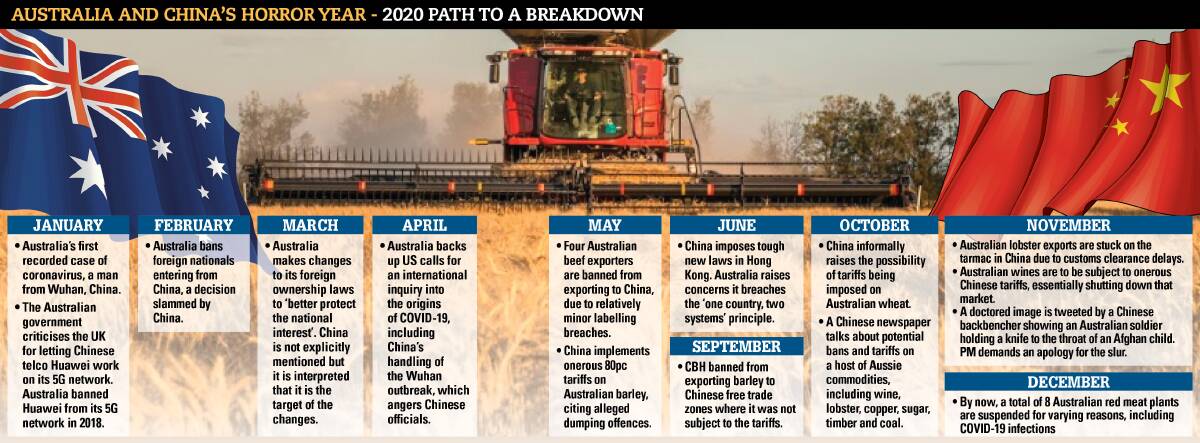
2020 will forever be the year of COVID-19.
Subscribe now for unlimited access to all our agricultural news
across the nation
or signup to continue reading
However, from an agricultural perspective, the long-term impact of the paradigm shift in Australian trade relations with China may rival the deadly pandemic in terms of long-term impact.
After a decade of increasingly reliance for China as an agricultural trade partner, with analysts and politicians talking up the near limitless potential for growth, the Asian giant made its displeasure with a number of Australian government decision abundantly clear in 2020.
Agriculture was one of the hardest hit industries, with new, onerous tariffs imposed on barley and wine, officially as retaliation for dumping into the Chinese market.
Barley and wine were two of the agricultural industries nominated by Rural Bank in a recent report as those most exposed to China.
However, while the barley tariffs, enacted in May, had the potential to be devastating to the Aussie barley industry, the vagaries of the global market meant it has not been as bad as it could have been.
Andrew Whitelaw, Thomas Elder Markets analyst, said in spite of the big local year for barley production, flagged by national forecaster ABARES to be 12 million tonnes, prices remained at decile 5, or average, values.
Ironically, he said indirectly it was China that was maintaining the good prices.
"Chinese demand for corn and soybeans has been insatiable this year," Mr Whitelaw said.
"It has had the impact of dragging all grain prices up, with the supply and demand balance sheet closing in."
"While China has not been buying Australian barley it has competed for grain from other exporters meaning other markets have opened up for Australia.
"It would have been better if we were selling direct to China, which does pay premiums, which is why buyers have focused so heavily on it, but barley is still selling."
Saudi Arabia, previously a massive buyer of Australian barley before dropping off as exporters focused on China, recently purchased a whopping 700,000 tonnes of our barley.
"If world values had been lower and there was less demand elsewhere the tariff decision would have been felt much more keenly."
However, Chinese disruption on Australian agriculture is set to continue.
Already this month, China has moved to ban more meat exporters, in both the beef and lamb sectors.
Initially, the first exporters banned back in May were ostensibly frozen out due to labelling issues, however the December bans have been accompanied by unsubstantiated Chinese media reports that COVID-19 may have found its way to China in frozen meat imports.
The ag industry is divided over the best way forward, with some calling for the tariff matters to be taken to the World Trade Organisation while others are advocating a more conciliatory approach.
The issue is muddied somewhat by the fact diplomatic relations have broken down to the extent Australian ministerial staff have been unable to speak directly to their Chinese counterparts.
Some farmers, such as Woomelang, Victoria, grain grower Chris Kelly, believe that Australia has been punished for its tough stance on issues such as the UN COVID-19 inquiry, where it backed US calls to investigate China's role in the start of the pandemic, and its position on Hong Kong, where it has criticised China's crackdown on democracy protests.
He said Australia had little to gain from backing up a traditional ally in the US that had focused heavily on pursuing unilateral trade deals with China in areas it competed with Australia, such as grains.
Others, however, felt that China was becoming increasingly aggressive in its demands on Australia and that the Australian government had to stand up to China or risk being bullied, not just on trade but on matters of domestic policy, such as foreign ownership and national security.
With the crisis deepening as the year draws to a close, the Australian industry, particularly sectors such as wool, as yet unpunished, but heavily reliant on China, are watching developments closely and hoping for a move to more normal relations.
However, others within the ag sector, pointing to Xi Jinping's more aggressive style of leadership compared to predecessor Hu Jintao, are more pessimistic about a return to the halcyon days of Sino-Australian trade of the 2010s.


